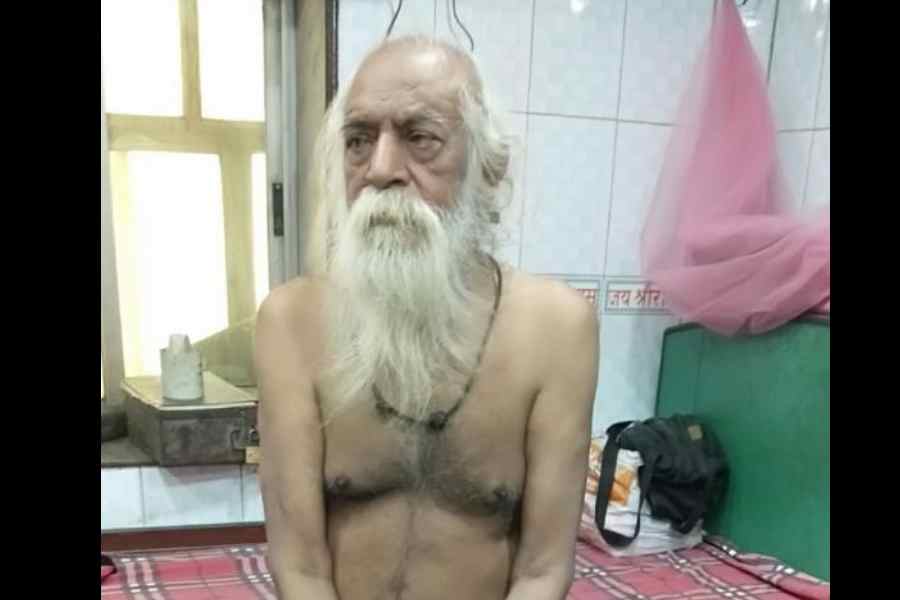Bajrang Das still gets teary-eyed when he recalls how, 83 years ago, he had walked 12km to try and catch a last glimpse of Rabindranath Tagore. When Mahatma Gandhi fell to an assassin’s bullet seven years later, he “lost all interest in politics”.
Still, he voted — in every general election since 1952 and every Assembly election — considering it his duty to the nation.
Not this time, though. When his Kolkata Dakshin constituency votes on Saturday, this 108-year-old will for the first time be unable to exercise his choice.
Election Commission officials never turned up to collect his vote at his home — the Ramjanki Shiv Mandir in Garden Reach where he has been living for the past 100 years and where he is now the ashram head or “main guru”.
The home voting process for the seventh phase was completed on Thursday.
Bajrang, who suffers from diabetes, acute kidney ailments and geriatric problems, can hardly get off his bed, making it impossible for him to visit his polling station at the civic body’s Borough XV office, just opposite the temple.
“Some people came and asked whether I can go to vote. I cannot get off my bed; how will I go to the polling station?” he told The Telegraph.
The Election Commission is allowing citizens aged above 85 to vote from home, provided they have applied via Form 12D within five days of the election notification (March 16).
A senior poll panel official said Bajrang had not applied, and so no team was sent to his home to collect his vote.
The centurion — who retains a sharp memory for events long past but tends to forget recent happenings — does not remember whether he had filled out any application form for home voting.
He said he had voted at the polling station in 2019, when he was 103. During the 2021 Assembly polls, he voted from home.
“Tin-char admi aye thhe aur maine vote diya thha…. Lekin isbar koi nahi aya (Three-four people had come and I cast my vote. But this time no one came).”
Some people in the locality suggested that local party leaders may have filled out a Form 12D on his behalf in 2021 but failed to do so this time.
According to Election Commission data, Bajrang was born in 1916. He recalls leaving his home in Ayodhya and walking all the way to Calcutta with his spiritual guru, Ramnagre Das, when he was just eight.
Ramnagre established the temple. After his death, Bajrang became head of the temple and ashram, where he stays with his three disciples — Sarju Das, Nirmal Das and Bimal Das.
“He can recall the past but doesn’t remember anything of present happenings,” Sarju said. “He sometimes forgets whether he has taken his meal. His health has deteriorated in the last five years; so, we keep a close watch on him.”
Bajrang spoke at length about the history he has been witness to: the freedom struggle and Independence, the Second World War, the assassination of Gandhi and the growth of democracy in the country.
He described how freedom fighters hid in his temple to escape the police. “Secret meetings were also held in this temple.”
His eyes moistened when he spoke about Tagore’s death and the communal frenzy of 1946 that killed thousands in Calcutta.
He said he did not do much reading and had no first-hand knowledge of Tagore’s works, but felt a deep yearning to see him one last time when the poet died on August 7, 1941.
“Main Nimtala Ghat gaya thha unko akhri bar dekhne ke liye, lekin itne log thhe, dekh nahi paya (I walked all the way to Nimtala Ghat to see his body but I couldn’t see him because of the crowd).”
On the communal riots, he said: “There were lots of killings. I don’t know how many but I haven’t seen so much blood in my life. People killed each other in the name of religion.”
Horrific communal riots had engulfed Calcutta for four days from August 16, 1946, claiming up to 10,000 lives.
Bajrang had been a staunch follower of the Mahatma. “After Bapu’s death, I lost all interest in politics and devoted myself to the service of God. There was nothing left in politics,” he said.
Why did he vote all these decades, then?
Bajrang smiled. “Kyun ki mujhe lagta hai yehi desh badal sakta hai (Because I believe that this alone can change the country).”











